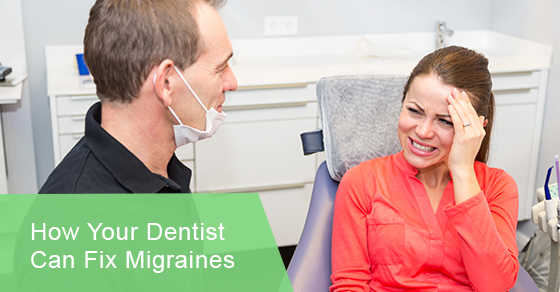Blog

How Your Dentist Can Fix Migraines
Posted by Dr. Julie Boudreault On 28-09-2021
Migraines are likely something that you would not want to wish even on your worst enemy. Millions of people suffer from these debilitating head surges of pain, particularly among women and those with a family history of the condition.
The worst part is that these migraines can often be hard to trace to one discrete source, meaning you’re left with treatment after treatment that doesn’t quite get to the root cause and fix the problem.
Thankfully, there’s still one more thing you can try if you’ve exhausted some of your other options. That is the method of dental care. That’s right, the bones and teeth in your mouth can be directly linked to the pain in your head.
While we can’t guarantee that it’ll fix everyone, there’s a chance that a trained dentist might be just what you need to fix your migraines. Read on to find out more.
Tracing Dental Roots to Migraines
First, we need to find out if there is a connection between your migraine and dental problems. This is easily done by looking at a list of the symptoms you might experience if your migraines are linked to tooth and dental problems.
If you wake up in the morning with painful jaw muscles, that could be a sign that you’re suffering from dental-related migraines. Also, if you have discomfort while chewing or grinding and have clicking sounds in your jaw, this can be another sign.
Try locating the headaches too. If they’re centred in your neck or temples there’s likely something you can do to treat them, and the same applies if the pain is occurring frequently in your traps or upper shoulder muscles.
And, most obviously, if you feel that your bite isn’t correct or that it’s constantly changing, then dental problems may be at the root of your migraine.
A dentist will make a thorough examination of your mouth and jaw, checking for problems with your temporomandibular joints, which connect your upper and lower jaw, and are tied to a whole range of issues with chewing, yawning, laughing, and even talking.
But once you’ve locked down the potential cause, what else is there to do?
Treatment Options
Once we’ve narrowed down the causes, it’s time to explore treatment options and start getting your life back together.
The first option to consider is temporomandibular therapy, which is specifically targeted to treat the most common issues related to malfunctioning in this joint. Problems here usually result from an injury or excessive grinding of teeth. If injured, the doctor will conduct x-rays to determine any necessary treatments for broken or fractured elements of the joints.
However, once this possibility has been eliminated, the solution can be as simple as starting to use a mouthguard, a standard dental appliance that can work wonders with relatively little effort and time commitment.
Simply wear this mouthguard as advised and it will protect the teeth and prevent the damaging effects of grinding at night. When this grinding is reduced, or alleviated entirely, you can expect pressure and tension on the surrounding joints to decrease. This decrease in pressure may result in removing your migraines or reducing their severity.
Toothache treatment is another method that may be used. The pain of an aching tooth can radiate out to all your teeth and even activate the nerve endings in your facial area. This means that you will experience pain all over the face, sometimes resulting in debilitating migraines.
Treatment for this is well-practised and safe. The decayed tooth will be treated and regardless of the method, you can expect migraines and toothache pains to go away while reducing the future risk of cavities.
Lifestyle Changes
While dental treatment is likely the best option to get your problems dealt with on a quick basis, you may also want to consider some lifestyle changes to make things even easier and healthier for you in the long run.
There are many things you can do that will unexpectedly affect your health, your teeth and your mind. For instance, you should definitely avoid chewing hard things, like fingernails and pens. Although your teeth are strong, hard surfaces can reduce their longevity while also exerting unnecessary pressure. A simple tip is to cut hard food into small pieces instead of biting directly into it.
Also, try to stay away from any intentional teeth grinding. And if you decide to play rougher contact sports, make sure to wear a mouth guard to protect your teeth.
Conclusion
Migraines are a terrible thing to have to deal with. Fortunately, they don’t have to be an untreatable life-long problem. In fact, it’s possible to treat them with dental procedures if properly diagnosed. So why continue suffering when you can deal with the root cause today?
So we’ve run through the ways your migraines can be caused not by something in your head but actually something in your teeth and jaw.
To learn more about migraine and dental health, call Milltown Dental at 833-318-3281 or visit us here.


Posted on 17-11-2021 by Green Door Dental
Great article source to read. Thank you for sharing this info.